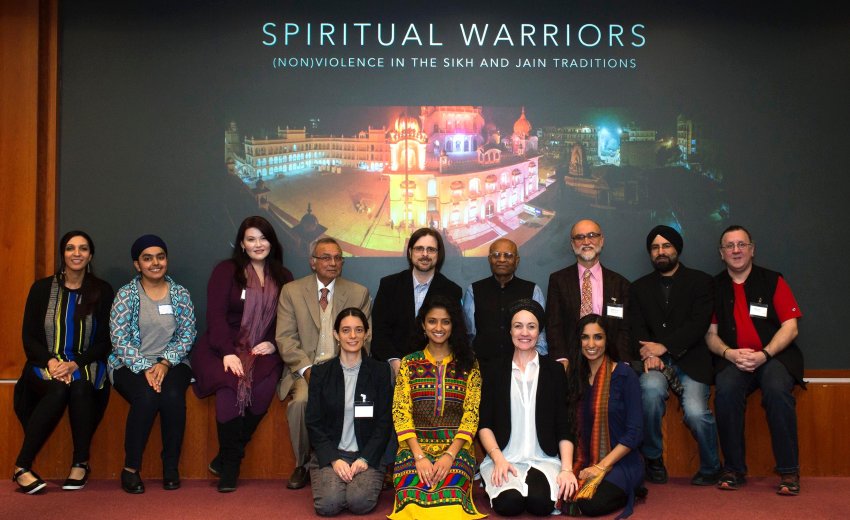The second annual Sikh and Jain conference “Spiritual Warriors: Non-Violence in the Sikh and Jain Traditions” February 23-24, 2017 was organized by the first ever Jain and Sikh Studies professorship held by Nirinjan Kaur Khalsa, Ph.D. which is hosted in the Department of Theological Studies at Loyola Marymount University in Los Angeles, California. This conference brought together prominent Jain and Sikh scholars working in the interdisciplinary fields of Bioethics, Philosophy, Religious Studies, Anthropology, Feminist Studies, Visual Studies, and Literature to explore the themes of violence and nonviolence in diverse ways. Additionally, Jain and Sikh activists gave talks on nonviolence and revolutionary love to frame the conference, whose purpose it was to speak directly to the current moment by bringing Sikh and Jain perspectives and practices of love and care for one another as offerings to the darkness of our times in which rage, hate, and fear seem to pervade.
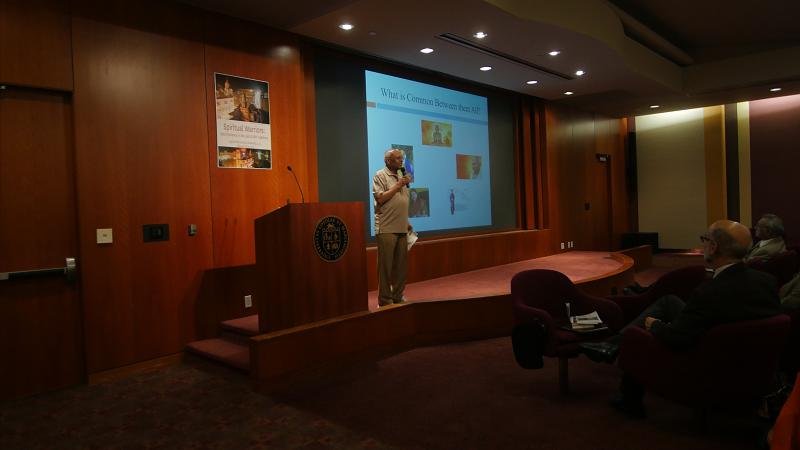
On Thursday Feb 23 at 7pm Dr. Sulekh Jain gave the inaugural lecture as part of the annual “Virchand Gandhi Memorial Lecture” on “Nonviolence and Ethics within Business.” Dr. Jain’s talk brought awareness to the various ways in which businesses do not operate ethically. Because they are primarily profit driven they often neglect the common good. His highly engaging talk offered the ways in which Jain values of honesty, transparency, non-stealing, and non-harm could allow for both profitable and ethical business models.
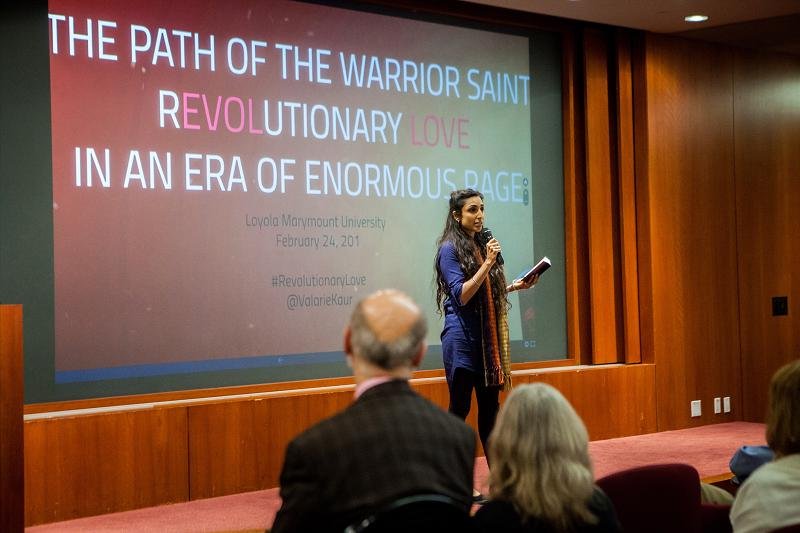
On Friday Feb 24 at 7pm Valarie Kaur closed the conference with her talk “The Path of the Warrior Saint: Revolutionary Love in an Era of Enormous Rage” by sharing concepts from the Sikh tradition of how, during this era of enormous rage, we can see, live and act in Revolutionary Love. Her talk framed Love as a commitment rather than how it is often marketed – as a momentary and fleeting feeling. Such a Love can be Revolutionary as it ground our interactions with others, ourselves, and even our opponents in a commitment towards each other’s flourishing. Her talk began by highlighting the wake of hate crimes against brown bodies since 9/11 and the current immigration ban, with the recent killing of Srinivas Kuchibhotla in Kansas City that happened just two days prior as well as the the first post 9/11 murder of a Sikh man Balbir Singh Sodhi, which happened only 4 days after the towers fell. Both killed were Indians mistaken for terrorists by people filled with fear, anger, hatred, and rage. Valarie urged us to not give into such emotions, but instead approach ourselves, others, and even our opponents with love and forgiveness. Through examples from her own life she illustrated how “forgiveness is not forgetting, forgiveness is freedom from hate” and urged us to inculcate love through our own spiritual practices. In this way the Warrior Saint idea can be interpreted for modern day, where our swords are now our pens, film cameras, stories, arts, and law degrees.
Valarie Kaur is an highly engaging and inspiring speaker whose videos have recently gone viral, one having reached over 16 million views. Her participation at this conference brought the conference, program, and university to a wider audience. In line with the experiential nature of the scholarly program, two spoken word pieces were delivered by Mayuri Bhandari, an MA student in Yoga Studies program at LMU (herself a Jain). Her piece “Listen” spoke about environmental awareness cultivated through a meditative mindset as well as “Blake Snake,” a response to her experience protesting at the Dakota Access Pipeline.

On Friday Feb 24th we had a daylong conference with scholarly lectures. The day began with Professor Nirinjan Kaur Khalsa’s talk “Living as Spiritual Warriors in the Jain and Sikh Traditions” which framed the intention of the conference by exploring how the Sikh and Jain traditions offer tools to live as Spiritual Warriors. While there is a perceived paradox between the Jain pacifist and Sikh warrior traditions; both traditions are grounded in the recognition that violence can start and end with the self through the internal conquering of desires and the passions of ego, hate, anger, fear, etc. Khalsa illustrated how the Sikh and Jain practices offer perspectives and actions to quell the ego and desires, allowing for a “mental ahimsa/non-violence” that recognizes all life as interconnected, and compels us to serve and protect all life in the name of equality, compassion, and justice.
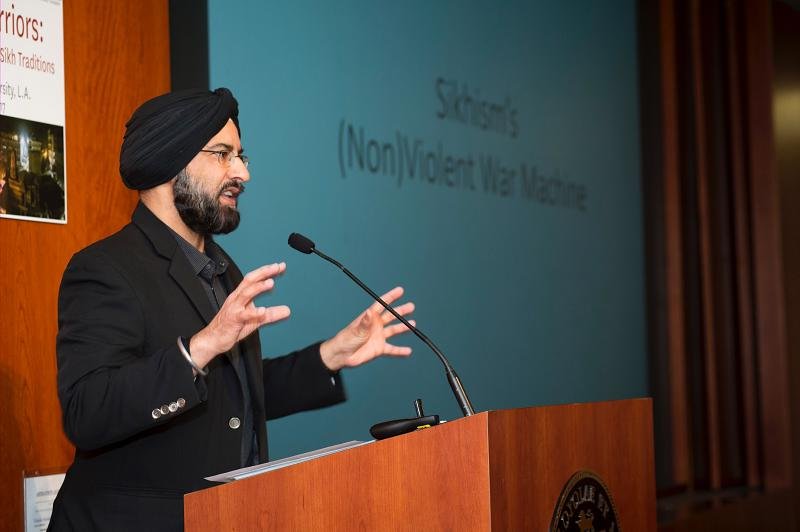
Professor Arvind Singh Mandair (University of Michigan) presented “Sikhism’s Nonviolent War Machine” as a way to reinterpret violence and nonviolence. Guru Nanak can be understood as using a quietest form of “violence” through poetry and song to resist social inequality and oppression. In this way, the warrior identity given to the Sikh community by the 6th and 10th Sikh Gurus was not a deviation from the earlier “mystical” practices (as is the common misconception) but instead operates at differing registers of violence to counter the symbolic and overt violence of the State.
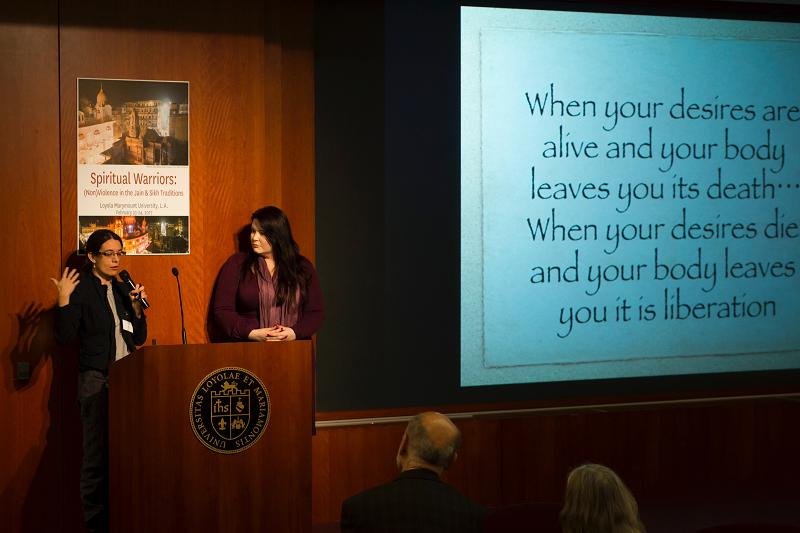
Professor Whitny Braun (Loma Linda University) spoke about the Jain practice of Sallekhana or fasting to the death which was recently outlawed in Rajasthan as “suicide.” Her talk “Sallekhana American Style: The Final Days of Bhagwati Gada” offered case studies to question whether the federal government should have a right to regulate how or why a person chooses to die. She poignantly articulated that while the Indian Constitution outlaws “suicide,” it was based not on a moral ground, but instead modeled after British law and the Crown’s need to keep citizens alive so they could be taxed and conscripted. She contrasts this notion of the illegality of suicide with Jain moral and ethical principles that view the body as a mere vehicle for the soul, wherein fasting is a method to purify the soul of all karma allowing it to find ultimate liberation. In this way, liberation, not death, is the ultimate goal.
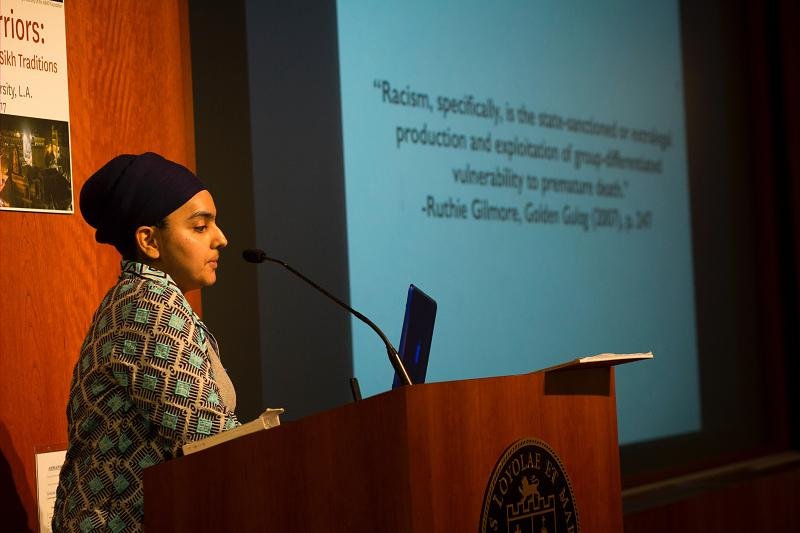
Tavleen Kaur (Ph.D. Candidate, University of California at Irvine) gave a talk “Vandalized Walls, Repurposed Halls: Hate and Heritage in the Public Sphere” illustrated how hate crimes are caused by Americans who are unable to distinguish between the “brown varieties.” She demonstrated how media portrayals of Sikhs has led to physical injury and even death of Sikhs as well as vandalism in the Gurdwaras – all of which the state appears to legitimize by labelling them merely as “hate crimes.”
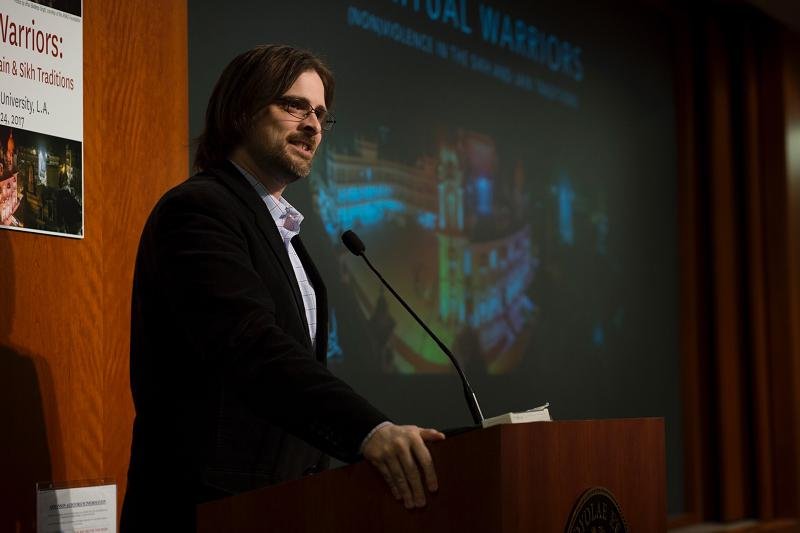
In his talk “Qualifying Ahimsa: On Hemacandra’s Ambivalence Toward War in the Trisastisalakapurusacaritra” Professor Steven Vose (Florida International University) questioned whether Jainism views the intent or effect of violent acts as more karmically significant. He used various scriptural examples to illustrate how this question is difficult to answer definitively because text is an evolving discourse that changes through time, authors, and interpreters.
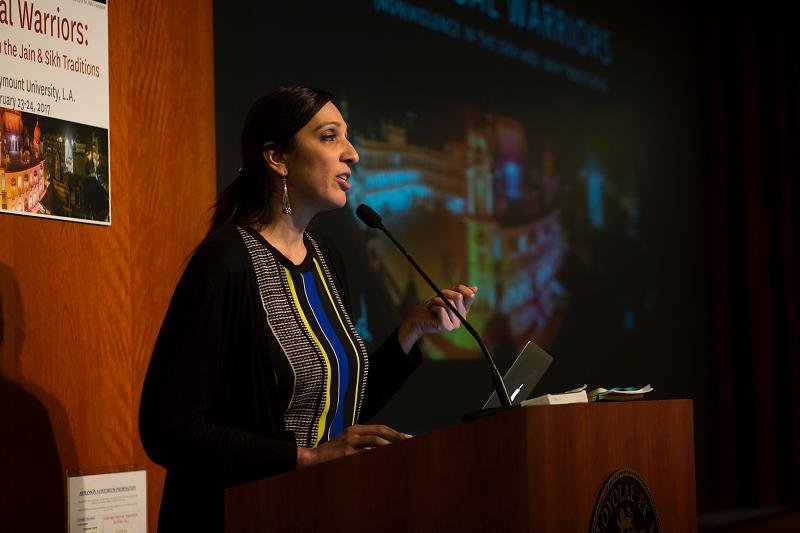
Professor Anneeth Kaur Hundle (University of California, Merced) illustrated how a lot of work still needs to be done within Sikhi and feminist theory by offering avenues for further investigation in her talk “Feminism and Sikhi: Traditions, Critiques, Praxis.” She questioned whether women must emulate patriarchal norms to survive institutional roles and urged women of color to engage each other in this evolving discourse.
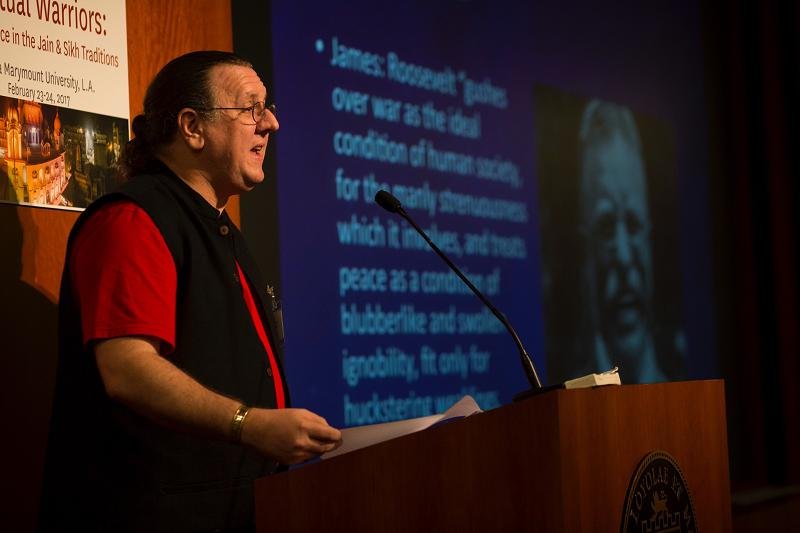
The last speaker of the day, Professor Jeffery Long (Elizabethtown College) closed our session with his talk “Ahimsa Meets Samsara: The Paradox of the Spiritual Warrior” by speaking about the inevitability of violence when within the cycle of samsara (life and death). Due to this natural law, in which death is ever present, he highlighted the difficulty of the spiritual warrior path that must involve constant spiritual practice to maintain an ethic of non-fear nor hate when acting in the world.
The conference witnessed strong audience participation by LMU students, faculty, as well as professors from other universities, and Jain and Sikh community members. Particularly we had a strong showing in the audience of Sikh women working on Social Justice who had come for the Sikh Women’s retreat held at LMU the following day. There has been a lot of positive feedback and movement in relation to this interfaith coming together. The engaging talks allowed participants to think about the current political moment in dynamic ways due to the productive Jain and Sikh notions of violence and nonviolence which give tools for how we as global citizens can live as Spiritual Warriors who respond to hate with love.
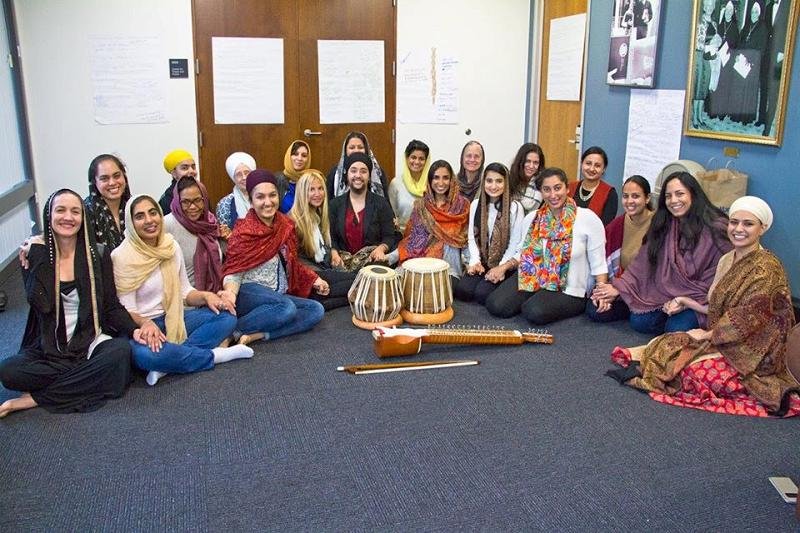
After the conference, on February 25th LMU hosted the “Mai Bhago Retreat” a historic first ever meeting of Sikh American Women fighting for social justice through law, public policy, scholarship, business, education and the arts. They came together to support one another in this current political climate, where hate crimes against Sikhs and others continue to rise. This day-long workshop was held in the Marymount Center on the LMU Campus. This gathering was envisioned by Valarie Kaur of "The Revolutionary Love Project" at USC, was sponsored by the Sikh and Jain program at LMU, organized by Nirinjan Kaur Khalsa Ph.D. and was supported by the Sikh Coalition. The retreat program was developed and led by Lisa Anderson of Auburn Seminary in NYC who brought her Sojourner Truth Leadership Circle to this community of Sikh women, a circle “which aligns the creation of vibrant and sustainable models of activist leadership with an emphasis on self and community care as a defining and galvanizing mandate for social justice in the 21st century.” This experience was life giving creating a strong sisterhood of Sikh women who care for and support one another in their various roles as modern day “Mai Bhago” warriors. The success of this retreat has compelled the women to develop this network of care through bi-annual retreats.
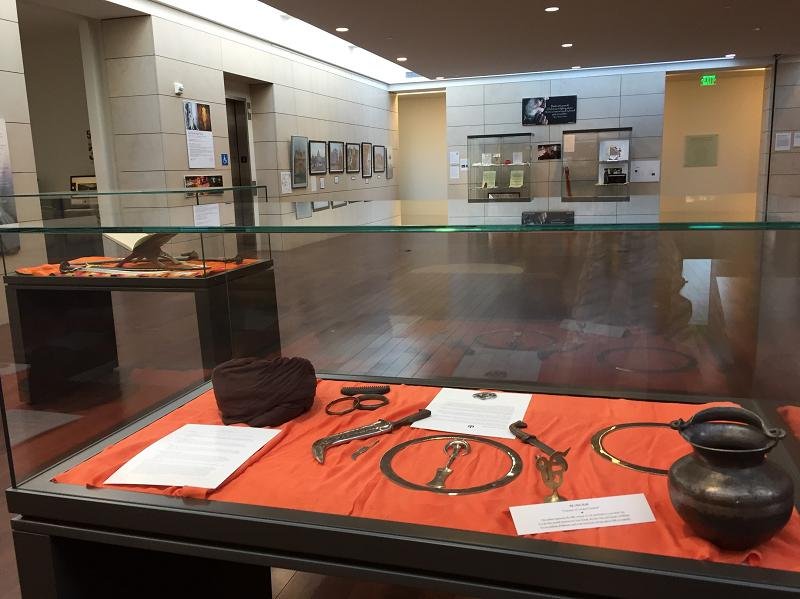
In connection to the conference the Sikh and Jain professorship and its students set up an Exhibit at William H. Hannon Library a month prior to the conference which displayed Sikh and Jain Spiritual Warrior weapons, including Sikh swords and daggers as well as musical instruments and scripture for conquering “spiritual” enemies and monastic “spiritual” weapons for nonviolence such as their robes, brooms, scriptures, etc. Also on display were temple images and Jain precepts and panels explaining Jain social and environmental activism. The library reported this as a highly visited and engaging exhibit.
Sikh and Jain program at LMU
The first ever Jain and Sikh Studies program hosted in the Department of Theological Studies at Loyola Marymount University in Los Angeles, California was developed to support the study of and dialogue between these two minority Indian religions. It was established in 2015 with the support from the Uberoi Foundation, Delhi whose goal it is to promote "understanding, communication, tolerance, and peace among the diverse peoples of the world" and generous individuals in the Jain and Sikh communities of Southern California. This program was envisioned and brought to fruition by Dr. Sulekh Jain a mechanical engineer, professor, author, and Ahimsa advocate and Dr. Harvinder Singh Sahota, the father of the perfusion balloon in angioplasty, generous supporter of Sikh Studies and Sikh awareness advocate. It was their own personal friendship and dedication to highlighting these under-represented religious traditions – that gave them the vision to bring these two traditions together within one professorship: Jainism - arguably the most ancient Indian religious tradition and Sikhi – the most recent; with Jainism dedicated to letting others live (ahimsa) & Sikhi dedicated to helping others to live (seva). Both traditions reject the caste system, believe in true equality between genders, ethnicities, castes, classes, and creeds. These shared perspectives of interreligious understanding and support is particularly highlighted through the friendship between Sulekh Jain and Harvinder Singh Sahota who affectionately refer to themselves as Sulekh “Singh” & Harvinder “Jain.”
Loyola Marymount University is the ideal site for bringing the Sikh and Jain communities together due to the University’s long-standing support of Indian religious traditions reflected in the Doshi Professor of Indic and Comparative Theology held by Christopher Chapple as well as the first US based MA in Yoga Studies Program established in 2013. Loyola Marymount’s mission embraces "inter-faith dialogue" to move "beyond tolerance to mutual respect and understanding” and “Creates opportunities for engaging others” by promoting the “education of the whole person and the service of faith and the promotion of justice.”
